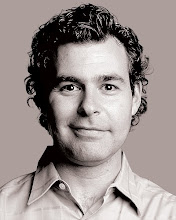
My piece ran today in the New York Times about the four-day convention of the American Society for Aesthetic Plastic Surgeons. It was a fun story and freelance shooter Isaac Brekken had a really cool slideshow pictorial on the website showing some of the visuals of the event.
As usual, some stuff got left out due to the space or because of its appropriateness in the publication. For instance, I'm not sure that readers fully "got" what was being said in this passage:
"Stem cell treatments were on the minds of many as well, although the potential applications are vague. The thinking seems to be that doctors may some day be able to extract stem cells from a patient’s own fat and use them in lieu of breast implants to produce self-regenerative tissue that would provide a more natural feel than silicon-gel or saline, now the standard. No one is sure yet if it will work and several doctors voiced concern as to whether it is safe and how they would be able to regulate the tissue growth."
You see, the doctors fear that the stem cells...COULD NEVER STOP GROWING. In other words, ever-expanding boobs. EEK!
 I also interviewed a Dr. Julius Few, a Chicago-based plastic surgeon who has made a bit of a specialty out of nose jobs and other procedures for ethnic minorities, namely blacks, Hispanics and Asians. He's pioneered this field because people of color have different needs in terms of what they want out of their surgeries; they're not just trying to look white. And most plastic surgeons have experience in only operating on white people with white features. As Michael Jackson shows us, you put a Caucasian nose on a non-Caucasian person at everyone's peril.
I also interviewed a Dr. Julius Few, a Chicago-based plastic surgeon who has made a bit of a specialty out of nose jobs and other procedures for ethnic minorities, namely blacks, Hispanics and Asians. He's pioneered this field because people of color have different needs in terms of what they want out of their surgeries; they're not just trying to look white. And most plastic surgeons have experience in only operating on white people with white features. As Michael Jackson shows us, you put a Caucasian nose on a non-Caucasian person at everyone's peril.That is discussed in the story. But one part that didn't fit was when I was quizzing Dr. Few about features other than noses and eyes/eyelids that are ethnically specific. He indicated there were some lower body parts that black women prefer a certain way. To wit:
Few: "If the proportions of the hip and buttock area are not in a certain proportion, that in some way doesn’t match the cultural expectation."
Friess: You mean you have black female patients who come in for butt enlargements?
Few: Yes.
Friess: Wow. How often?
Few: I do about 10 of those a year.
I've been attacked by an earworm of a a certain Sir Mix-a-Lot ditty since this exchange.
And, finally, I thought this was really interesting but I didn't have space to use it. I was asking various surgeons what the Holy Grail of the field is. Most mentioned erasing cellulite, but Dr. Brian Kinney of Los Angeles had an intriguing response:
 Kinney: To me, it's increased elasticity.
Kinney: To me, it's increased elasticity.Friess: What do you mean?
Kinney: Elasticity in the skin. People get facelifts so they can look younger. We have two choices right now. Either we tighten the face by pulling and cutting or we fill it up. Well, the filler people say fill all the wrinkles and then you look like a chimpmunk. The surgical people say pull all the wrinkles and then you look like you’re in a wind tunnel. And young people don't look like that. We know that young people's faces are neither pulled nor overfilled. So how do we smooth out the wrinkles and get elasticity to the skin?
Kinney also provided me with a few examples of how the economy has impacted the plastic-surgery set. One is in the Times story, but this one didn't make it in:
"Another example is a late-30s mom who was going to have a tummy tuck and her breasts done, a mommy-tummy. She said, 'I’m only going to do my breasts, not my tummy.' So I’ve seen people downsizing what they’re doing."
I wonder if anyone's had just one boob done. You know, cuz these are hard economic times.








4 comments:
Gee, Steve. Looks like the hex of that crazy tabloid guy is really slowing you down!
I wonder which would be worse, doing just one boob, or just one buttock?
Jeff in OKC
http://www.manbitestinseltown.com/2009/05/the-danny-gans-death-mystery-deepens.html#more
Cosmetic surgery and medicine has emerged as a newspecialty and thus has not been a significant part of the training of any of the established Colleges.
Post a Comment